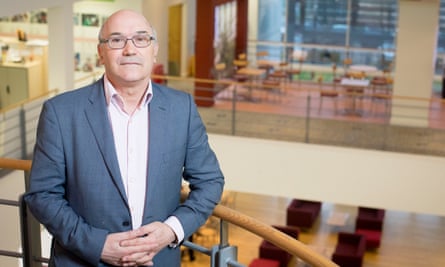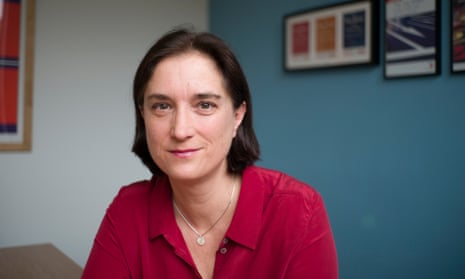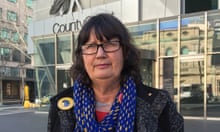As the Oxfam scandal thundered and churned all last week, Vicky Browning, who has led the Association of Chief Executives of Voluntary Organisations (Acevo) for just over a year, found herself tweeting: “If we want charities to be transparent – and we do – we’re unfortunately going to hear more about things going wrong.” And: “If we are going to continue to do the work we are most proud of, we must actively confront the parts of the sector we are most ashamed of.”
It’s less than three years since the sector was rocked by the exposure of acute governance failings in the charity Kids Company’s collapse and widespread fundraising malpractice following the suicide of 92-year-old poppy seller Olive Cooke, who was subsequently found to have been “overwhelmed” by requests for money by charities.
“I think we have grown up a lot as a sector in the last three years,” says Browning. “When Olive Cooke died we went a bit rabbits-in-headlights. There was also a sense of disbelief – ‘we’re the good guys, we don’t need to apologise because the work we do is so important’. I think that feeling of entitlement to the benefit of the doubt has really diminished. In this last week, as a sector, we have come out and said, ‘Yes, mistakes have been made. We are not perfect and we need to do better and this is what we are going to do about it’. The sense that we are slightly untouchable because of the nature of our work has gone. This is the new normal, this is what it’s like now.”
Browning, 51, is well-placed to comment on image and messaging. For seven years before joining Acevo she was director of CharityComms, the body for charity communications professionals.
As her tweets about Oxfam suggested, she is a plain speaker. She has little time for mitigation of Oxfam’s errors, other than to contextualise them in wider society’s challenges over safeguarding. And she shows scant sympathy for the view – hinted at by Oxfam’s chief executive, Mark Goldring, in a Guardian interview at the weekend – that it has been singled out for harsh treatment by critics of its campaigning and of overseas aid policy in general.
“That’s too easy an excuse,” she says. “Certain charities tend to be more in the spotlight because of the stance they take. Given that Oxfam talks about justice and poverty – that’s what it’s for – it has to be robust enough to stand by those things when people have a go [at it]. We need to tackle what this is really about.”

So is it a failure of leadership? Of Goldring, Browning says: “He is really respected in the sector; he is seen to be a good leader and a sensible voice. He has done a huge amount of work at Oxfam.”
The charity’s mistake, she says, was to have been transparent about its sexual exploitation scandal in Haiti in 2011, and commendably so, but only up to a point: “It was not fully open. It didn’t go far enough. If you are going to be transparent only about some of the things you hear and know, that’s not good – that can be dangerous.”
Equally, she says, the public has to sort out the “cognitive dissonance” she thinks it has about charities: that it wants them to be transparent, but reacts badly to what they disclose; that it expects them to have rigorous internal processes, but resents their spending on administration; and that it thinks there are too many of them, but is suspicious of big ones.
Choosing her words carefully, she expresses “disappointment” with comments in the Sunday Times by the outgoing Charity Commission chair, William Shawcross, that “some of the charities’ umbrella bodies see themselves as trades unions for their members, rather than encouraging them to see that their conduct may sometimes be imperfect”. She hopes for better relations with Shawcross’s nominated successor, Tina Stowell – although Acevo has been notably less effusive than some other sector bodies in welcoming the Tory peer, who has pledged to resign both the whip in the Lords and her party membership if her appointment is confirmed.
“What she has said is great, but there is a whole bigger thing of being seen to be politically neutral,” says Browning. “There are really important questions to be asked about moving this process [of appointing the commission chair] away from the political fray.”
Browning has been disappointed, too, by the low profile throughout the Oxfam scandal of the charities minister, Tracey Crouch, whom she likes and respects but fears has too big a brief. Crouch is primarily minister for sports and has also recently had policy on loneliness added to her responsibilities. Browning thinks this reflects a wider loss of appreciation in government of the strategic importance of the voluntary sector. “Charities do get involved with specific, cause-related issues, such as domestic violence”, she says, “but the sector’s standing as a valued partner is where we have lost out.”
Browning is concentrating on stabilising Acevo’s membership numbers and cutting its £138,000 deficit on a turnover of £1.1m in 2016-17. It has 1,200 members ranging from leaders of small, community based groups, to medium-sized charities, and international NGOs. Although Goldring isn’t currently a member to receive its advice and support, she admits: “I would like him to be.
“We need to be seen unequiv–ocally as the organisation that develops and supports good leadership in the sector. That’s our niche, but in the recent past I don’t think that has always been seen as our full focus.”
Curriculum vitae
Age: 51.
Lives: North-west London.
Family: Married, two teenage sons.
Education: Newstead Wood grammar school, Orpington, Kent; Durham University (BSc, natural sciences)
Career: 2017 to present: chief executive, Association of Chief Executives of Voluntary Organisations; 2010-17: director, CharityComms; 2006-10: consultancy; 1990-2006: editing and publishing roles, Haymarket Publishing; 1988-90: assistant editor, Prestel.
Public life: School governor.
Interests: Reading, cooking, gardening, country walks involving pubs.











Comments (…)
Sign in or create your Guardian account to join the discussion